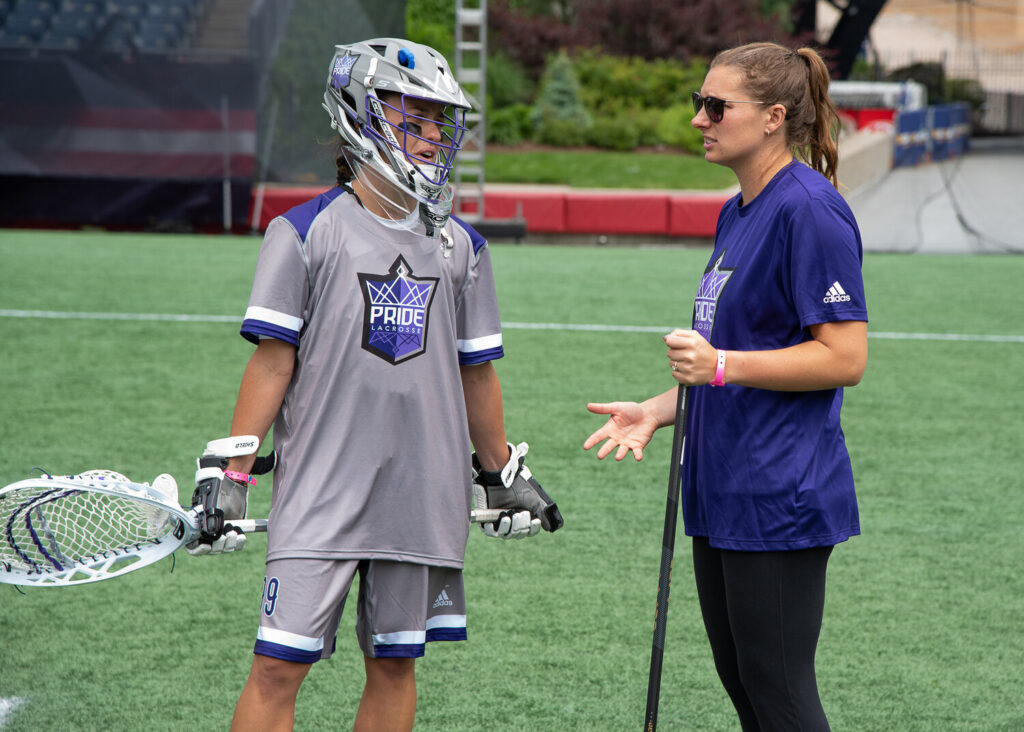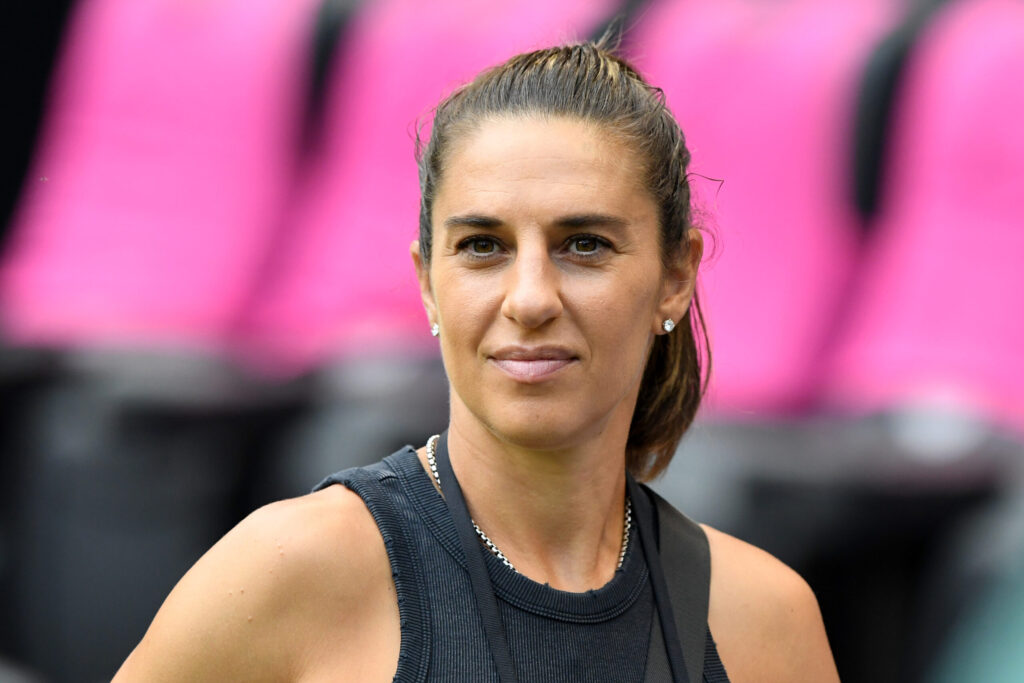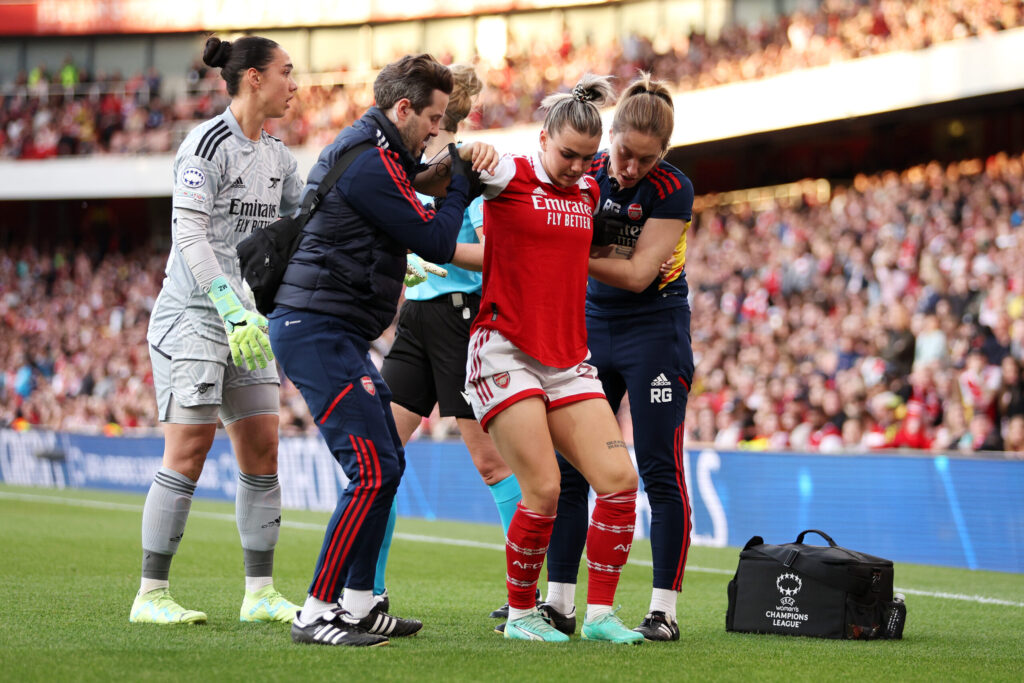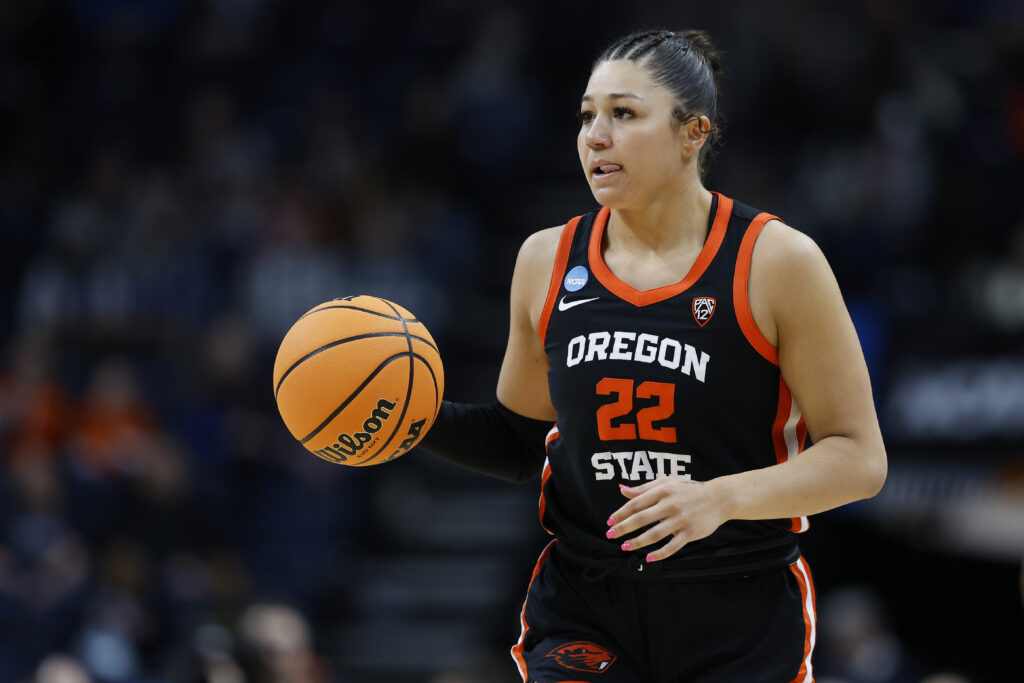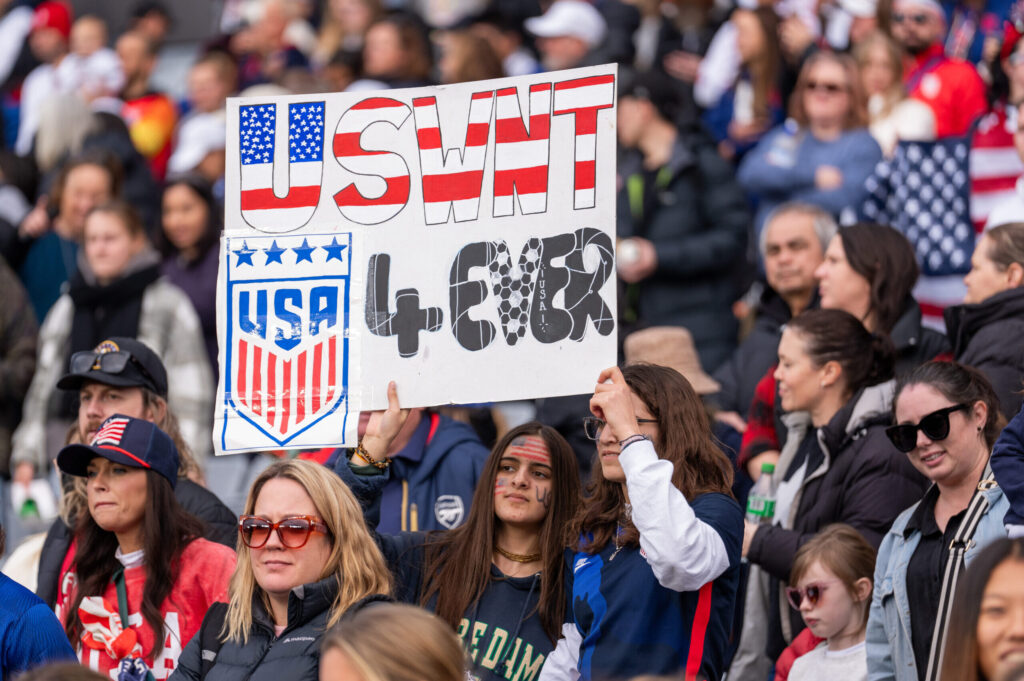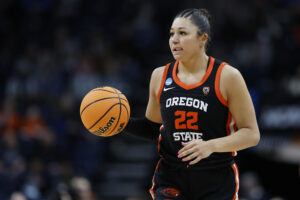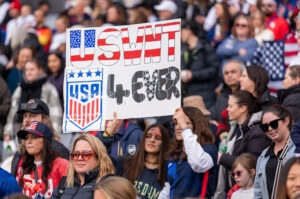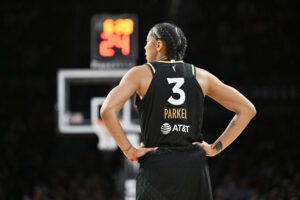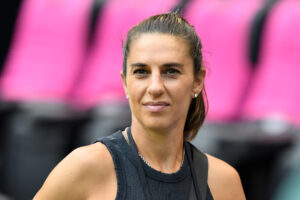Liz Hogan is a professional lacrosse player who plays for Pride of the WPLL and Team USA. Syracuse University’s all-time saves leader, Hogan spoke to Just Women’s Sports about what it means to be a member of the LGBTQ+ community in the world of sports, how lacrosse can become more inclusive, and how she’s using her platform to press for change.
What does it mean to you to openly be a member of the LGBTQ+ community in sports?
For me, the biggest thing is that it gives me a purpose because I want to add another story, another example, another outlet for other people to understand the LGBTQ+ community. Then, if they are a little bit more understanding of their own sexuality and realize that maybe they fall into this community, I can give them an outlet to find a role model, find a mentor, and realize that it is possible to be a great athlete and a great person, while still being gay. There are a lot of stigmas surrounding gay people. To be able to be out and open, I can shed extra light on the kind of person you can be, even if other people are labeling you in a negative way.
How does your mindset change from being a member of the LGBTQ+ community in sports to general life?
I am definitely outspoken in the world of lacrosse and on my Instagram. When it comes to life outside of sports, though, I am a pretty private person. It’s not like I won’t go wave a flag or anything, but I’m more private. I found the love of my life. I have a fiancé and I’m super passionate about having a great life with her. I do teach in a Catholic school, which is interesting, but they are supportive of me. It’s something that I haven’t really brought up to my students, mostly because they are so young. But once the time comes, I hope I can show them the paths that I’ve taken and be a sounding board for them when they’re going through difficult times.
You mentioned being a role model in the lacrosse community for younger players dealing with similar issues about coming out. Do you think this applies to your students, too?
For sure. Living in California, it is a little bit easier than anywhere else. I am thankful that the school that I work at has been super supportive. We’ve had transgender people, we’ve had gay people, we’ve had bisexual people. Despite the fact that there is this connotation that if you’re Catholic, you can’t be those things, the school is super welcoming and open to the kids. I do look forward to being a role model for my students, but I’m also thankful for the groundwork that has already been laid out for us.
Do you think that being an athlete helped to give you the confidence to come out?
I don’t know if it gave me the confidence to come out. I would say, if anything, it might have actually sheltered me for a little bit longer because I could be out to my teammates, but I had that buffer where I didn’t have to tell my parents. I had this comfort zone where I could tell a couple of people, but at the same time, it protected me from having to deal with truly being out to closer family and friends. If I wasn’t part of an athletic community, I wouldn’t have had that. I don’t think it’s necessarily right or wrong. I think we all have our own stories and our own timelines. I am thankful that athletics introduced me to a lot of people who helped me to find myself and who helped me to navigate the process of coming out. I don’t think I would have met those people without athletics.
Do you think that the lacrosse teams you have been a part of have been inclusive?
Yes. I think women’s lacrosse is unique in that teams are pretty inclusive — at least the teams that I’ve been a part of and the majority that I’ve heard of. I have always felt super comfortable around my teammates and my coaches. I definitely was never the only gay person or the only person who identified as LGBTQ+ on the team either, so I’m thankful in that sense. There has been a pretty wide awareness in women’s lacrosse, at least recently. A lot of our founding sisters who started lacrosse in the U.S. were gay themselves, so we kind of have a leg up in that department.
Do you think that there is still room for women’s lacrosse to improve inclusivity, and if so, how?
A hundred percent. While people are inclusive and generally welcoming, I think a lot more can be done in terms of the conversations we have in our locker rooms. How can we create inclusive environments without having to have that person come out, right? Most people will be nice to you when you come out, but what is the environment and what are the conversations happening beforehand? And not just about the LGBTQ+ community, but about Black Lives Matter, too. Are we inclusive to everyone in that locker room, regardless of what you can and can’t see? There is no visible sign when someone is gay — you can hide it from people. The important thing is making sure everyone feels included, even if they are unsure about who they are at the moment.
Do you feel obligated as an athlete to use your platform to speak out on LGBTQ+ issues?
I have battled this throughout the past few years as social media has become a bigger part of our lives. Initially, I was hesitant for various reasons, from not wanting to upset sponsors to not wanting to upset my own family when I knew they weren’t comfortable with it. Recently, I have definitely embraced it more. I think of myself growing up and the role models that I wish I would have had. I really hope that by being my authentic self, it allows other people to understand and to see that it’s okay, and to maybe find their own path a little bit easier.
Your fiancé is a former lacrosse player. How long have you two been engaged for?
Well, that is a tricky question. We got engaged last year. We were actually supposed to be married right now. We were supposed to get married last Friday. So, we’ve been engaged for about a year. Our backup wedding date is August 14th, and then our backup backup date is next June. If it doesn’t happen then, I told her we’re just eloping, and I’m done with it.
What is it like to share a sport with your significant other?
It’s interesting because we have two very different perspectives about lacrosse. She played at USC, finished her career, and that was it. She didn’t want to play professionally. She didn’t want to play for the U.S. team. She was content with where she was after college. We all have different experiences. Even I took a year off after college because I wasn’t sure if I still wanted to play. I was burnt out. It’s been nice to have her as a sounding board while I am playing and she’s not. I can always tell her what’s going on, and she gets it. She’s not like some person who’s never seen the sport and thinks I’m catching butterflies. It’s nice to have someone that is athletic and can shoot on me and can help me train. But, then it’s also nice to have someone who understands the mental toughness that goes into it as well.
You recently participated in a speaker series for U.S. Lacrosse in celebration of Pride Month, speaking about equality in sports. What was that experience like?
U.S. Lacrosse is hosting a four-part speaker series with two moderators, one men’s national team player and one women’s national team player. I participated in one that was about life as an LGBTQ athlete. I think there are a lot of athletes who question their own identity and there are a lot of coaches who want to know what they can do to better support their players. I found it really cool that U.S. Lacrosse sent the speaker series out to their members. They are always talking about inclusivity and sometimes the LGBTQ+ community can be overlooked since we are a minority in the sport. We need to make sure that we are continuing to educate people.
U.S. Lacrosse also created another initiative called Clinics for Change. What is this program about?
Between the men’s and women’s programs, we decided to have four simultaneous clinics based on your position, not based on your gender. The players will be learning from the men’s national team players and the women’s national team players. While people pay to attend the clinics, we will not be making any profit. All of the proceeds will go to four different organizations revolving around Black Lives Matter and Athlete Ally, which is an LGBTQ+ platform for athletes.
We are really trying to use our social media and our current status on the U.S. national team to drive change. We are all volunteering our time to teach lacrosse at a really low rate, which is super cool. At the same time, we are passing it forward. Not only are we helping people to understand the sport, but we are using the proceeds to benefit people who may not even play lacrosse.
Lacrosse is a predominantly white sport. What do you think it means for the lacrosse community to come together in an initiative like this?
I’ve seen the lacrosse community come together so much over the past two weeks or so. Normally the focus would be on celebrating Pride Month, but I think we are all starting to realize that we have to be each other’s allies, whether you’re black, whether you’re gay, whatever it is. We are all realizing that, at the end of day, we are all lacrosse players. It is our duty to be allies to one another. It has been incredible to see some of the biggest names in lacrosse step up to promote education about inclusivity. Our first goal is to just get people talking. I’m hopeful this is not a two-week or a one-month trend. I’m hoping we continue the conversation beyond this month.
You play for the U.S. women’s national team. How does the training and selection for the team work?
The way the U.S. team works is interesting. The World Cup is in 2021 — fingers crossed it happens. The last go around was in 2017 and, before that, 2013. It’s every four years like the soccer World Cup. It used to be that you tried out in the summer and then you would be on the national team for the entire year. Recently, they have taken on the model of U.S. Soccer where there are training camps that you are either invited or uninvited to each month. Right now, we’ve been training with a pretty consistent cohort of athletes, so we identify as being on the U.S. women’s national team. However, only 18 of us can go to the World Cup in 2021, so it will get pared down. I’ve been a part of the training program since 2012, so it’s been awhile.
Everything is up in the air right now with COVD-19. Have they made any announcements about upcoming events for Team USA?
We have Zoom calls every few weeks to get updates. We were supposed to be in training camps right now, but that didn’t happen. As far as I know, U.S. lacrosse has pushed off everything through July. They’re hoping to get things started up in August. They are trying to hold the Fall Classic at the U.S. Lacrosse headquarters, and then hopefully have something in November and January, as well. It’s hard because it might look good now, but what if there is a spike in September? You just never know.
You also play for the WPLL Pride. Your season was unfortunately cancelled this year, but what excites you about playing for the WPLL?
For me, the coolest thing is that we get to see the best talent from around the world in a small number of games. On the national level, you’re putting the best players per nation on one team, but there are a lot of really good players who don’t make it to that final team. So, the best part about the WPLL is showcasing that talent in front of young lacrosse players, who can then aspire to be a professional women’s lacrosse player themselves. We are able to show them the really cool things you can do with women’s lacrosse.
